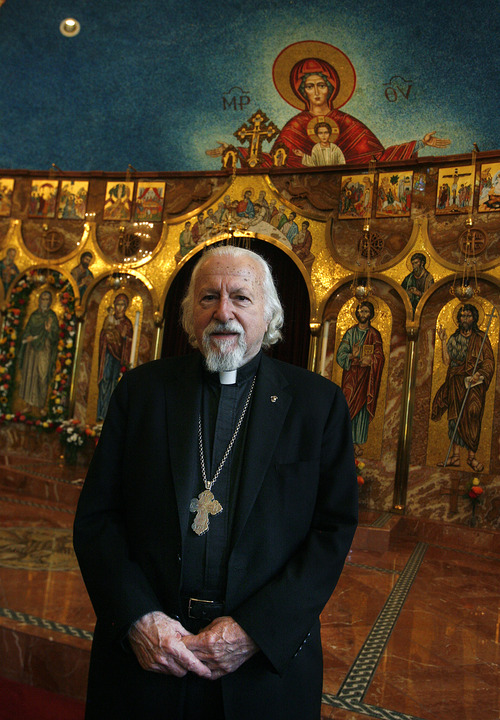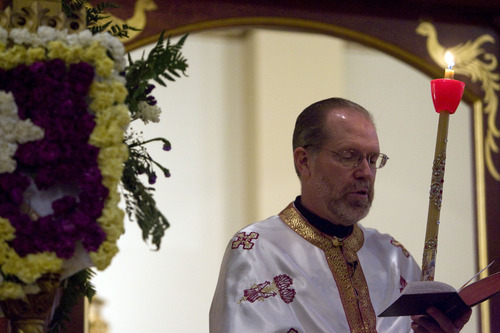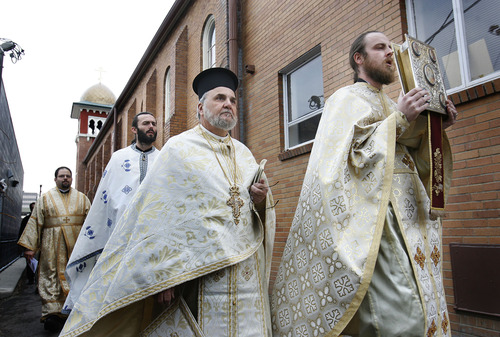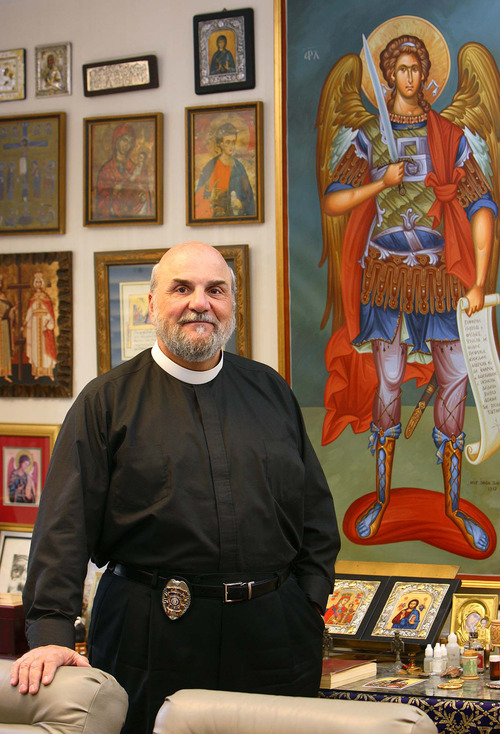This is an archived article that was published on sltrib.com in 2013, and information in the article may be outdated. It is provided only for personal research purposes and may not be reprinted.
By official decree, rites marking the Feast of the Transfiguration were allowed to take place Monday and Tuesday in the Salt Lake Valley's two Greek Orthodox churches, Holy Trinity and Prophet Elias.
But that's it, for the time being. There won't be any more Sunday services. No baptisms or weddings, either.
Metropolitan Isaiah, the Denver-based Greek Orthodox leader whose region includes Utah, recently ordered the three clergy members serving the community to "immediately suspend all priestly ministry to the parish."
"They are not to celebrate any liturgy, sacraments or services whatsoever," he added, later modifying the order to permit the priests to conduct the Great Vespers, Orthros and Divine Liturgy for the Feast of the Transfiguration. "This includes Sunday liturgies, beginning this Sunday, Aug. 4, and all scheduled weddings and baptisms."
His directive came after the cash-strapped Parish Council voted July 29 to cut the pay of the three priests by 40 percent to balance the 2013 budget.
"Our community is out of money and unable to meet the payroll this week," the Parish Council explained the next day in a letter to parishioners.
The 40 percent reduction for the three priests — Father Michael Kouremetis at Prophet Elias in Holladay, Father Matthew Gilbert at Holy Trinity in downtown Salt Lake City and Father Elias Koucos — will save the parish $124,980 annually, the council calculated.
"It is with heavy hearts that the Parish Council must take such action," the letter to parishioners said, "but [we] feel this is what must be done to try and keep our community solvent during this trying time."
Parish Council Chairman Dimitrios Tsagaris declined to say much more about the financial issue in response to questions from The Salt Lake Tribune.
"This is an internal issue. We're working with the Metropolitan to find a solution," was all he would say. "I don't want to make a big deal out of something that will be solved soon."
But in an Aug. 4 letter sent to Metropolitan Isaiah and copied to parishioners, Tsagaris indicated that finding a solution would be difficult within a Greek Orthodox community often divided by schisms — particularly since Metropolitan Isaiah had rejected the council's decision to cut the priests' pay as a way for the parish to make ends meet.
"The foundation of unity needs to be solidified before the financial and spiritual health of our beloved community is restored," the letter said. "Given your ultimatum, the parishioners are left without any immediate relief nor any avenues which may provide a long-term solution."
Council members asked the Metropolitan to authorize the convening of a "special parish assembly," with the clergy present, "to decide on the best course of action."
But Metropolitan Isaiah, in a letter shared with The Tribune, rejected that request, contending he had no authority to organize a special assembly. Instead, he instructed Tsagaris' Parish Council to follow the archdiocese's regulations, then referred The Tribune to a protocol he issued last fall.
The Oct. 10 statement was made in response to requests from several parishes about clergy salaries. It emphasized it was the "duty of the Parish Council to provide for the priests' remuneration and benefits" as laid out in the archdiocese's clergy-compensation plan.
That plan describes different levels of salary and housing allowances, based on a priest's years of service, along with provisions for an automobile, health care, vacation, payments of Social Security and Medicare taxes and periodic sabbatical leaves.
"Parish Council members are obligated, as a fiduciary responsibility to the parish, to do everything that they can to develop and implement a stewardship program to afford the proper compensation for their assigned priest(s) … in full and on time," Isaiah's statement said.
Only the Metropolitan sets a priest's compensation level, Isaiah added. "It is therefore not within the capacity of a general assembly, nor of a parish council, to debate or determine the priest's compensation package. … It is not subject to debate or revision."
He also told The Tribune that the archdiocese does not cover a parish's financial shortfalls, noting that "in 2011, the $100,000 shortfall of the Salt Lake Parish was paid to the archdiocese by the 49 other parishes of the Denver Metropolis."
The priests were not available for comment, parish office workers said last week.
But there is support for restoring their pay. An email from protectourclergy@gmail.com circulated this week through the Greek Orthodox community, seeking the signatures of people who disagree with the Parish Council's decision to cut the priests' pay.
If Greek Orthodox faithful have a service, wedding or baptism that can't wait, there are options.
Metropolitan Isaiah said sacramental services "may be served" if a church member's request is forwarded to him by the parish priest.
Tsagaris also said Father Justin Havens, the priest at Saints Peter and Paul Orthodox Christian Antiochian Church in downtown Salt Lake City, has agreed to help out.
"Feel free to refer anyone to me who needs any help: sacraments, pastoral, emergencies, etc.," Tsagaris quoted Havens as saying. "I'm here to serve."
Twitter: @sltribmikeg









